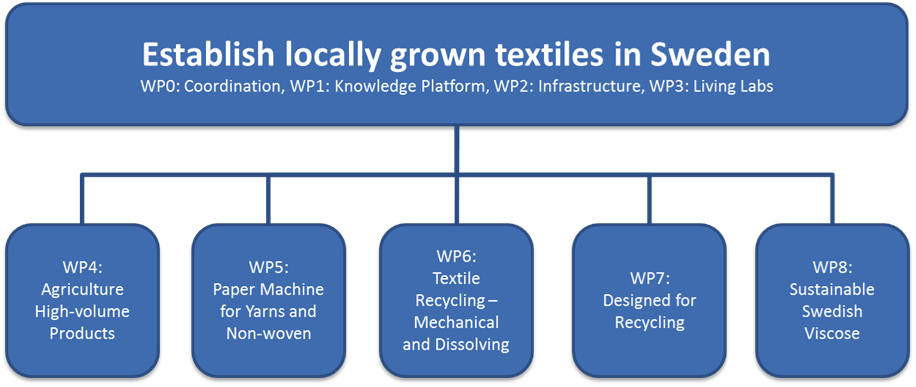The project Establishing locally grown textiles in Sweden (Etablera närodlad textil i Sverige, or ENTIS) began in October 2015 and ended in autumn 2018. The innovation project manager was Erik Perzon from RISE. The total budget for the project was SEK 43.16 million SEK.
“The project generated new knowledge of important parts of the textile value chain. Several stakeholders are carrying developments forward, and the results of the project are leveraged in, among other initiatives, the project Forest Fabric (Skogens Tyg). One area that is growing rapidly at present is recycled textiles. For example, Re:newcell, which was one of the project stakeholders, has just exported its first cellulose fibre made from textile waste,” says Erik Perzon from RISE, innovation project manager for the ENTIS project.
The challenge
The global need for textile fibres is growing and consumption is expected to triple by 2050. The explanation can be found in urbanisation and a growing middle class. The production of oil-based textiles and cotton fibres has already peaked and is putting strain on the environment in various ways. Therefore, the project investigated whether, and how, sustainable bio-based textile production can be achieved through the production of textile fibres using forestry raw materials or recycled bio-based textiles. The project represented a strategic initiative for the development of the textile materials field in Sweden.
Project aims
- Knowledge platform for cross-industry collaboration and new business models.
- Cellulose-based, high-volume products for agriculture, e.g. ground sheets for vegetable cultivation.
- Textile-like materials produced using paper-manufacturing machines.
- Improved value chain for the recycling of textiles in Sweden.
- Recyclable, bio-based furniture. Screen wall for public spaces.
- Investigation and demonstration of techno-economical and environmental opportunities for sustainable viscose production in Sweden.
Implementation and stakeholder constellation
The consortium consisted of just over 60 stakeholders representing universities, institutes, the public sector and companies in industries such as the textile and fashion industry, the forestry industry, the engineering industry, the furniture industry and recycling. The project consisted of nine work packages where coordination, knowledge platform, infrastructure and living labs were managed vis-à-vis the project as a whole, on an overarching level. The remaining five work packages developed specific products and services, with a focus on bio-based textile solutions for Swedish businesses.
List of stakeholders (pdf): https://wwwbioinnovation.cdn.triggerfish.cloud/uploads/2015/09/entis-aktorer.pdf
Project effects associated with the bioeconomy
The ENTIS project created a knowledge platform for new cross-industry collaboration and new business models for bio-based products and services. This, combined with individual examples which were developed and presented as proof-of-concept, contributes to Sweden moving closer to a bio-based, circular economy. The project delivered knowledge, processes and materials in the categories high-volume products for agriculture, textile materials using paper-manufacturing machines, recycling of textiles, recyclable furniture and sustainable, bio-based textile fibres. The expected effects of the project were the creation of new value chains and business models in Sweden for bio-based materials.
Sub-projects

The next step
“Together with Mistra Future Fashion, the project has created important conditions for Sweden to be able to invest in sustainable textiles. The fact that the government has tasked the University of Borås with creating a national platform for sustainable textiles is exciting and shows that Sweden wishes to continue to be a driving force at the forefront of these developments,” says Erik Perzon, Project Manager, RISE.
Contact
Erik Perzon, RISE
erik.perzon@ri.se
Kunskapsplattform
Här har projektet ENTIS samlat relevant kunskap i en kunskapsplattform. Plattformen togs fram under 2016 och har uppdaterats under tiden projektet var igång.
Notera att plattformen inte uppdateras efter att projektet har avslutats.
